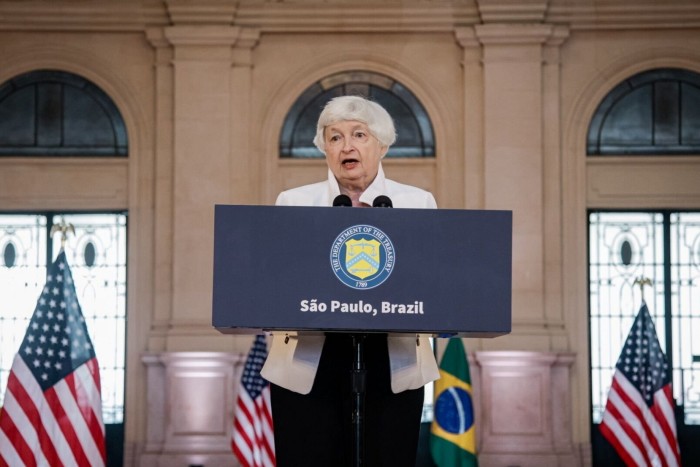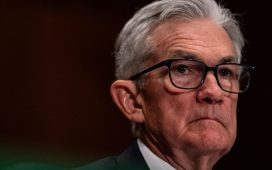Unlock the Editor’s Digest for free
Roula Khalaf, Editor of the FT, selects her favourite stories in this weekly newsletter.
A landmark global tax deal targeting the world’s largest companies is struggling to come into force as political support in the US and other key jurisdictions falters.
The enactment of the first “pillar” of the OECD-brokered reforms, which would make big tech groups and multinationals pay more tax in the place they do business, has stalled in the US amid opposition from Republicans.
Developing countries have meanwhile attempted to shift international tax negotiations from the OECD to the UN, where they would wield more influence, further complicating the talks over implementation.
These factors, plus difficulties finalising the treaty text, are imperilling efforts to meet a June deadline for its signing and have spurred a European push to find a way to revive the agreement when G20 finance ministers meet in São Paulo in Brazil this week.
“It’s something like a perfect storm. The OECD is stuck in a project with no real chance of success,” said one person with knowledge of the negotiations. “Pillar one is in a dead end because the US is not likely to ratify . . . and therefore you have an agreement which cannot be implemented.”
In 2021 over 135 countries signed up to a two-legged political agreement that represented the biggest corporate tax reform in more than a century. The second pillar introduces a global minimum 15 per cent corporate tax rate and started to take effect this year. However the first leg of the deal has proved harder to implement.
While US President Joe Biden’s administration has backed the reform, international tax treaties require a two-thirds majority — 67 votes — in the US Senate for ratification. Biden’s Democratic caucus, which holds a razor-thin lead in the chamber with its 51 seats, does not have the votes to overcome bitter opposition from rival Republicans.
Without US ratification, the required minimum tax base for the deal to enter into force would not be met.

Meanwhile, a possible electoral win by former president Donald Trump, the leading candidate for the Republican presidential nomination and a staunch opponent of the global agreement, would be likely to doom the entire process.
“The question is if after the elections there will be political buy-in [from the US],” said an EU official.
A US official rejected the characterisation that pillar one was dead but acknowledged there was pressure to reach a deal.
“There’s pressure on everybody, not just the US. There’s pressure on the EU and all the other 140 countries [involved in negotiations] to get an agreement,” he said.
And he added that US negotiators would not be “wasting their time” if they didn’t “think it had a chance to get to the finish line”.
Manal Corwin, head of tax at the OECD, said: “The momentum and the drive to finish the work remains. In order to deliver, everybody needs to deliver.”
European officials are trying to corral G20 finance ministers gathering this week in Brazil to commit to the June timeline. A draft of the G20 communiqué, seen by the Financial Times, calls for “reaching a timely agreement on the multilateral convention with a view to signing it by end-June 2024”. But wording on “swift implementation” requested by the EU and France are not included. The communiqué is under negotiation and could still change.
Meanwhile, since securing a greater role for the UN in global tax matters due to frustrations at the OECD-led process, developing economies are showing less interest in the pillar one negotiations. This is sapping further momentum to meet the June deadline, people with knowledge of negotiations said.
Brazil, which voted for the UN establishing a convention on international tax co-operation last year, currently holds the G20 presidency. It has invited the UN to present next steps on its tax agenda to G20 finance ministers meeting on Thursday. The OECD has also been invited.
The alternative to the global tax framework could be a patchwork of taxes set by countries on a go-it-alone basis, analysts say.
Back in 2021 several jurisdictions agreed to a moratorium on unilateral digital services taxes, levies that would mostly be felt by large, US-based technology companies, to allow for a multilateral agreement — but these could come back if the latter does not materialise.
“The EU should give the US a deadline, saying in 2025 the US needs to deliver with whatever administration. And if it doesn’t, the EU should pursue a digital services tax,” said Paul Tang, a member of the European parliament from the Netherlands working on tax issues.
In a sign of faltering hope, Canada last year moved ahead with its own digital services tax.
Danielle Rolfes, head of KPMG’s Washington national tax practice, said it was hard to predict what might happen if the deal failed.
But there was “bipartisan opposition to discriminatory taxes on US companies”, she added, in reference to unilateral digital services taxes.
“No US company wants to be in a trade war. This agreement is supposed to be the favoured way forward.”









